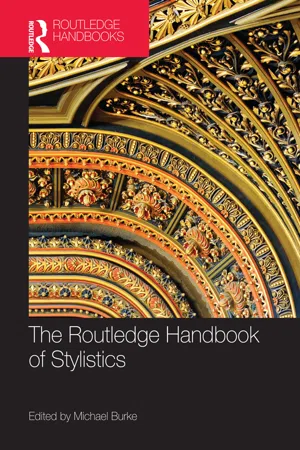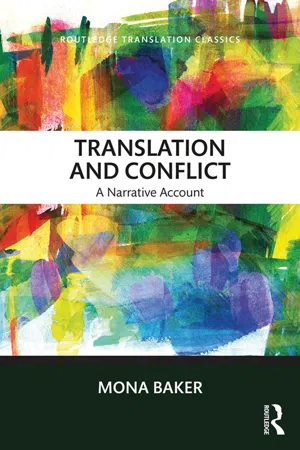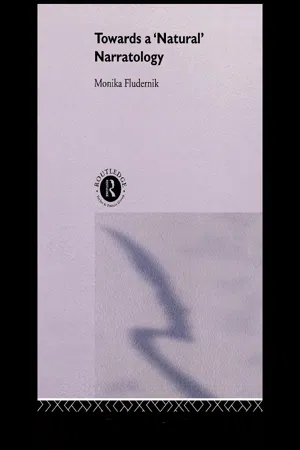Narratology
Narratology is the study of narrative structure and the principles of storytelling. It focuses on analyzing the elements of narrative such as plot, character, and point of view, as well as the ways in which stories are constructed and interpreted. By examining the underlying mechanisms of storytelling, narratology provides insights into the nature and function of literature.
6 Key excerpts on "Narratology"
- eBook - ePub
Narratology
An Introduction
- Susana Onega, Jose Angel Garcia Landa(Authors)
- 2014(Publication Date)
- Routledge(Publisher)
...Introduction DOI: 10.4324/9781315843018-1 Preliminaries Definition of Narratology Narratology is, etymologically, the science of narrative. The term was popularized, however, by such structuralist critics as Gérard Genette, Mieke Bal, Gerald Prince and others in the 1970s. 1 As a result, the definition of Narratology has usually been restricted to structural, or more specifically structuralist, analysis of narrative. The post-structuralist reaction of the 1980s and 1990s against the scientific and taxonomic pretensions of structuralist Narratology has resulted in a comparative neglect of the early structuralist approaches. One positive effect of this, however, has been to open up new lines of development for Narratology in gender studies, psychoanalysis, reader-response criticism and ideological critique. Narratology now appears to be reverting to its etymological sense, a multi-disciplinary study of narrative which negotiates and incorporates the insights of many other critical discourses that involve narrative forms of representation. Consequently, while our selection of texts in this reader gives ample representation to the original structuralist core of the discipline, it also includes samples of approaches which are narratological in the wider if not in the strict formalist sense of the term. Wider and narrower definitions Is Aristotle's Poetics the first narratological treatise? 2 Although Aristotle's work focuses on one specific genre, tragedy, it offers extraordinary narratological insights which are applicable to all genres that use plots. For Aristotle, plot (mythos) is the central element in a literary work, a narrative structure which is common to dramatic and narrative genres proper. The conceptual ambivalence of ‘narrative’ is present, then, from the very beginning of the discipline. A wider Aristotelian definition of ‘narrative’ might be ‘a work with a plot’ (e.g...
- eBook - ePub
Researching Interpretive Talk Around Literary Narrative Texts
Shared Novel Reading
- John Gordon(Author)
- 2020(Publication Date)
- Routledge(Publisher)
...3 Novels, Narratives and Narratology 3.0 Introduction The novel is a narrative form. When readers talk or write about how novels tell a story they perform Narratology. This chapter defines and explores the terms novel, narrative, narration and Narratology, first understanding them as they conventionally apply to the discipline of literary study and then relative to teaching and learning. It proposes that when teachers guide learning around novels they create new narratives, articulated across the teaching sequences by which novels are presented. These narrations deserve their own specialised account. The focus of this book is how teachers mediate students’ experiences of study novels, and its aim is to develop a new Narratology that helps us explain teachers’ narrative activity in their own talk and classroom practice, relative to novels already subject to the established narratologies of literary studies as an educational discipline. This is a project consistent with a gradual broadening of attention recognising that the study of narrative is no longer the province of literary specialists or folklorists borrowing their terms from psychology and linguistics but has now become a positive source of insight for all the branches of human and natural science. (Mitchell, 1981, p. 3) Considering novels and their presentation in education is to reflect on the relationship between novels and knowledge, and on how teaching frames and realises the form’s educative potential. If narratives constitute a mode of knowledge emerging from action, a knowledge which is embedded not just in the stories we tell our children or to while away our leisure but in the orders by which we live our lives, (Mitchell, 1981, p. 3) whatever learning children enjoy from their experience of novels in schools is shaped both by stories in print and by unique classroom mediations of them formed in each exchange between text, teacher and students...
- eBook - ePub
- David Herman(Author)
- 2011(Publication Date)
- Wiley-Blackwell(Publisher)
...And just as Saussurean linguistics privileged la langue over la parole, focusing on the structural constituents and combinatory principles of the semiotic framework of language, the narratologists privileged the study of narrative in general over the interpretation of individual narratives. Already in his 1957 book Mythologies, Barthes had analyzed diverse forms of cultural expression (advertisements, photographs, museum exhibits, wrestling matches) as rule-governed signifying practices or “languages” in their own right (Barthes [1957] 1972; cf. Culler 1975). Barthes extended this general approach in his 1966 “Introduction”; instead of offering interpretations of individual narrative texts, Barthes sought to capture elements of the supra- or transtextual code in terms of which people are able to identify narratively organized discourse and interpret it as such. Indeed, the use of (Saussurean) linguistics as a pilot-science shaped the object, methods, and overall aims of structuralist Narratology as an investigative framework. Narratology’s basic premise is that a common, more or less implicit model of narrative explains people’s ability to understand communicative performances and types of artifacts as stories. In turn, just as (some) linguists have set themselves the goal of identifying the ingredients of linguistic competence, the goal of Narratology is to develop an explicit characterization of the model underlying people’s intuitive knowledge about stories, in effect providing an account of what constitutes humans’ narrative competence. To be sure, the example of linguistics provided Narratology with a productive vantage-point on stories, affording terms and categories that generated significant new research questions...
- eBook - ePub
- Michael Burke(Author)
- 2017(Publication Date)
- Routledge(Publisher)
...Fowler takes structuralist Narratology to be a ‘valid and important’ enterprise in the study of the novel (1977, p. xi) and treats the narratological distinction between story and discourse as a general framework for his stylistic analysis. In Style in Fiction (1981), Geoffrey Leech and Mick Short also take Narratology into account. In the section entitled ‘the rendering of the fiction,’ they draw on the narratological analogy between structures of narrative and structures of language and ‘pursue the analogy between choices of rendering made on the fictional plane, and stylistic choices made on the linguistics plane.’ They have singled out three elements of fictional technique to deal with, namely, point of view, sequencing, and descriptive focus. In The Stylistics of Fiction (1990) Michael Toolan draws on some narratological concepts or distinctions, such as ‘extra-diegetic’ (outside the story) versus ‘intra-diegetic’ (inside the story) narration by Genette (1980), covert narrator versus overt narrator by Chatman (1978), and focalization (a narratological term for point of view) by Genette and later by Bal (1985). A more extended effort to draw on Narratology is made by Paul Simpson in Language, Ideology and Point of View (1993), where we find reference to the narratological distinction between story and discourse in various forms, to Genette’s discussion of narrative time, as well as to the narratological models of focalization and narration (see Chapter 10 in this volume). In her Feminist Stylistics (1995), Sara Mills investigates the roles that female characters can fill, based on a modified version of the work by Propp, a forerunner of structuralist Narratology...
- eBook - ePub
Translation and Conflict
A narrative account
- Mona Baker(Author)
- 2018(Publication Date)
- Routledge(Publisher)
...2 Introducing narrative theory The notion of narrative has attracted much attention in a wide range of disciplines, and has accordingly been defined in a variety of ways. This chapter will draw primarily on social and communication theory to elaborate a definition of narrative that is particularly suited to investigating the way in which translators and interpreters function in situations of conflict. I start with an overview of the status and effects of narrativity, including its relationship to genres, science, categories, fact and fiction, and conclude with a discussion of the political import of narratives and the way in which narrative both reproduces existing power structures and provides a means of contesting them. 2.1 The status and effects of narrativity Many scholars, especially in literary studies and linguistics, tend to treat narrative as an optional mode of communication, often contrasting it with argumentation or exposition. Approaches that treat narrative as an optional mode tend to focus on the internal structure of orally delivered or literary narratives – in terms of phases, episodes and plots, for instance – and to stress the advantages of using narrative, rather than other modes of communication, to secure the audience’s commitment and involvement. The best and most influential example of this tradition is Labov. A very brief summary of his approach might help clarify important differences between literary and linguistic approaches to narrative and the broadly sociological approach adopted in this book. Labov defines narrative as ‘ one method of recapitulating past experience by matching a verbal sequence of clauses to the sequence of events which (it is inferred) actually occurred’ (1972: 359–60; emphasis added), and what he calls a ‘ minimal narrative ’ as ‘a sequence of two clauses which are temporally ordered ’ (1972: 360; emphasis in original)...
- eBook - ePub
- Monika Fludernik(Author)
- 2002(Publication Date)
- Routledge(Publisher)
...2 Natural narrative and other oral modes The relationship between the practice of everyday storytelling, on the one hand, and the writing of novels, on the other, has on the whole eluded narratological research. There are various reasons for this state of affairs. For one, there exists a plural consensus that oral narrative and the novel have nothing or very little in common. 1 Narratology, except for its structuralist origins in folk-tale analysis (Propp 1968), has concentrated on fictional narrative, mostly on the eighteenth- to twentieth-century novel, with some subsidiary consideration of the short story. 2 Recently, there has been a new trend to consider medieval narrative, and narratological insights are currently being brought to bear on the epic. 3 The novel and the epic, as art forms, seem to be considerably more sophisticated than conversational narrative, although work on oral poetry suggests a close link between oral literature and the chansons de geste, the early German verse epic, and equivalent English forms (Bäuml 1985; J.H.Fisher 1985; J.M.Foley 1985a). To exclude the analysis of oral narrative from Narratology is therefore quite unjustified. Formulaic oral poetry, it has been demonstrated, frequently preserves some of the formulaic features and many of the structural and compositional aspects of the oral language on its way from orality to written composition (which originally entailed oral performance). On the other hand, the status of epic formulae in the written epic is arguably different from their original function in the still entirely oral literature...





